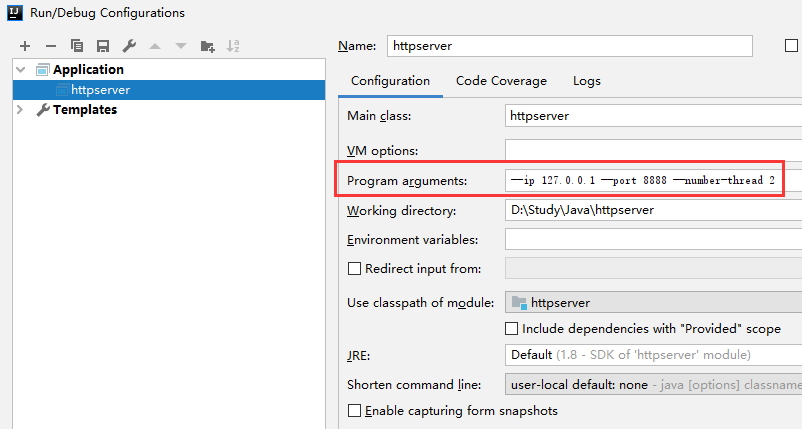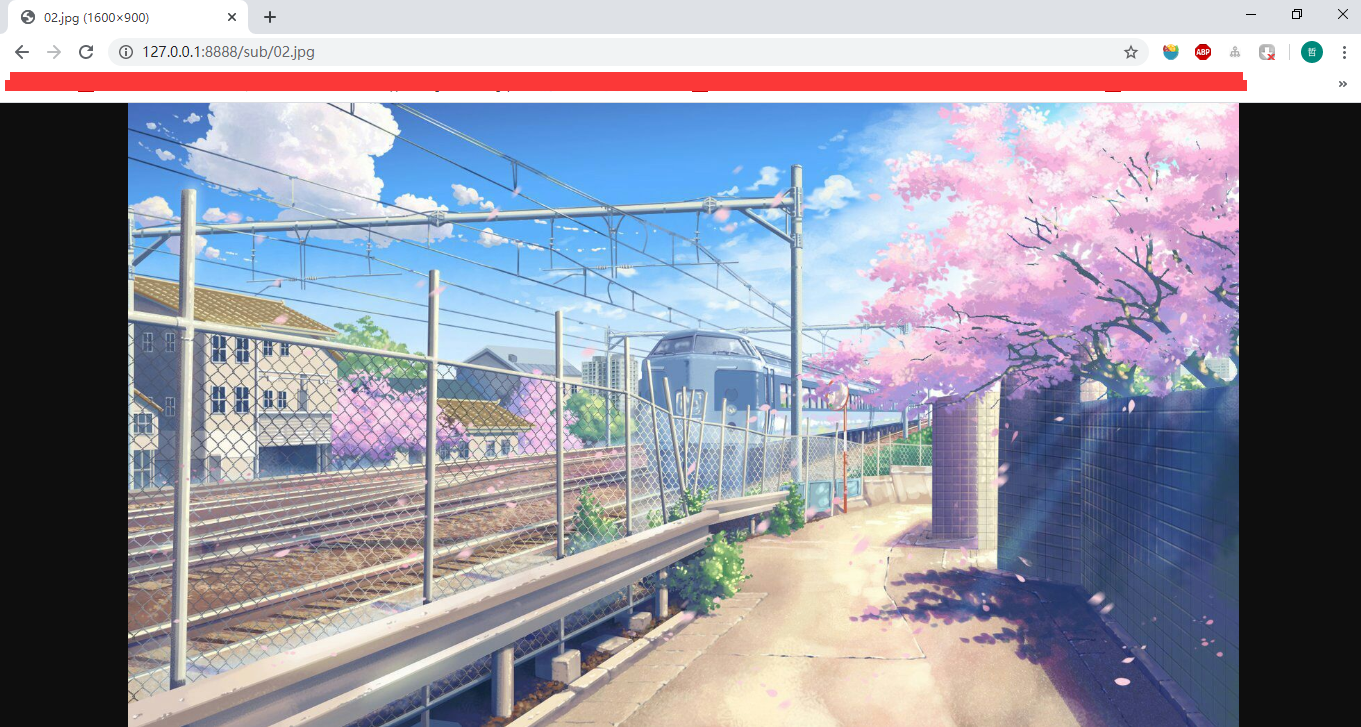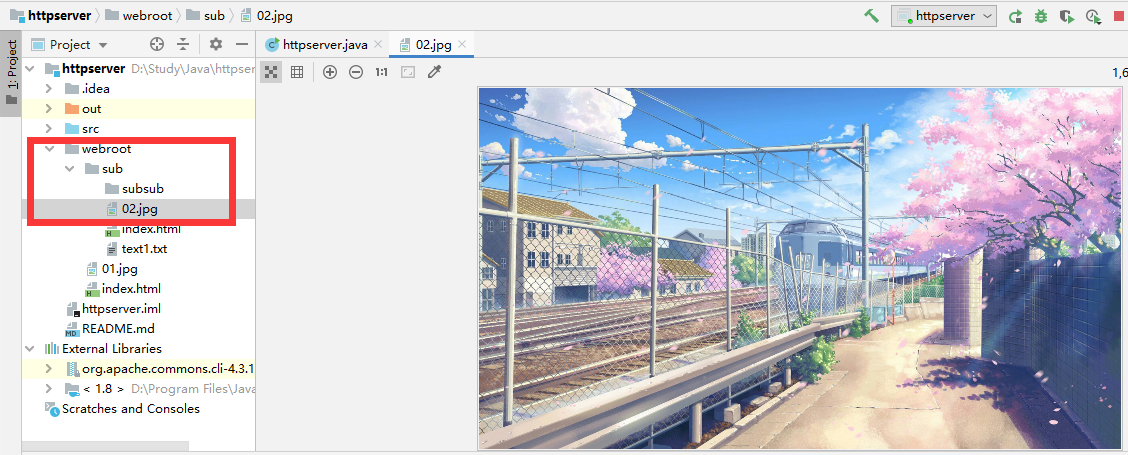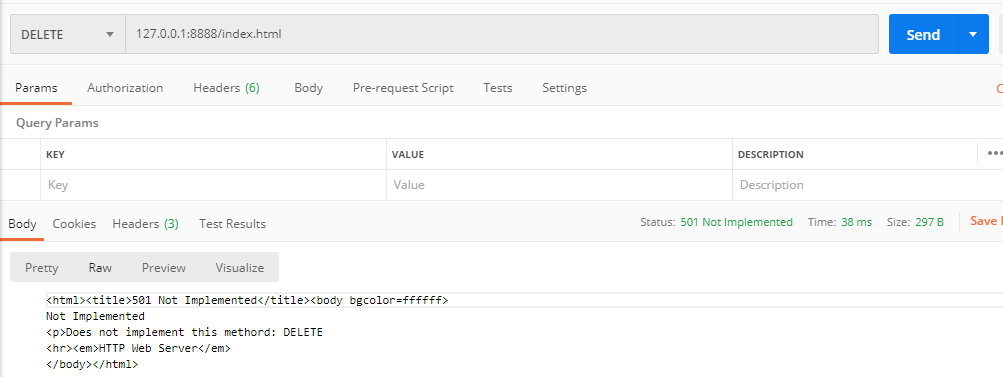CSDN链接:https://blog.csdn.net/qq_40889820/article/details/105814895
利用Java的com.sun.net包下的http类,实现的简易http服务器。全部代码已上传至github,链接在文末。
主要功能为:
1、只处理GET方式和POST方式的请求,其他的返回 501 Not Implemented
2、GET:1)如果请求路径为一个存在的html文件,返回200 OK和该html文件的全部内容。(对子目录下的文件同样也要能返回);2)如果请求路径为一个文件夹,且该文件夹内有index.html文件,返回200 OK和index.html文件的全部内容;3)如果请求的文件不存在,或者请求的路径下无index.html文件,返回404 Not Found。
3、POST:1)构造一个HTTP请求,包含两个键值对:Name:姓名 和ID:学号,提交给/Post_show。服务器收到请求后返回200 OK且输出以POST方式发送的Name和ID;2)其他情况如请求路径不为Post_show或键的名称不为Name和ID,返回404 Not Found
4、使用多线程处理,具体为线程池方式实现
5、支持长选项参数:1)--ip 设置服务器端的IP地址;2)--port 设置服务器端监听的端口号;3)--number-thread 线程数目。
这里只贴windows环境下测试的结果了。
Run->Edit Configurations 设置参数
也可以不设置,默认值就是上图中的数
点击运行
这个“当前路径”设置的是:
private static final String WEB_ROOT = System.getProperty("user.dir")
+ File.separator + "webroot";后文有解释。在webroot文件夹内存放了一些子文件夹和html文件等。
浏览器中输入
127.0.0.1:8888/sub/02.jpg
便可请求到图片D:\Study\Java\httpserver\webroot\sub\02.jpg
curl现在是win10自带的了吧,不用安装直接能用。不过需要注意的是windows和linux下的curl使用存在区别。
Postman是个很棒的工具!
参考IDEA打包jar包详尽流程打成jar包,放在E盘
此时将webroot和httpserver.jar放在同一目录下
请求方式和1中介绍过的类似
主要用到的是org.apache.commons.cli包,需要下载。
private static void HandleOption(String[] args) {
CommandLineParser parser = new BasicParser();
Options options = new Options();
options.addOption("i", "ip", true, "Specify the server IP address");
options.addOption("p", "port", true, "Selects which port the HTTP server listens on for incoming connections");
options.addOption("n", "number-thread", true, "The number of threads");
try {
CommandLine commandLine = parser.parse(options, args);
if (commandLine.hasOption('i')) {
IP = commandLine.getOptionValue('i');
}
if (commandLine.hasOption('p')) {
PORT = Integer.parseInt(commandLine.getOptionValue('p'));
}
if (commandLine.hasOption('n')) {
ThreadNum = Integer.parseInt(commandLine.getOptionValue('n'));
}
} catch (ParseException e) {
e.printStackTrace();
}
}如参数给出--ip 127.0.0.1 --port 8888 --number-thread 2,则将全局变量IP设为"127.0.0.1",PORT设为8888,ThreadNum设为2。这些值也是默认值。
public static void main(String[] args) {
//System.out.println(WEB_ROOT);
HandleOption(args);
HttpServerProvider provider = HttpServerProvider.provider();
HttpServer httpserver = null;
try {
httpserver = provider.createHttpServer(new InetSocketAddress(IP, PORT), ThreadNum);//监听端口PORT,能同时接受ThreadNum个请求
httpserver.setExecutor(Executors.newFixedThreadPool(ThreadNum));
} catch (Exception e) {
e.printStackTrace();
}
httpserver.createContext("/", new MyHandler());
httpserver.createContext("/Post_show", new PostShowHandler());
httpserver.start();
System.out.println("当前路径:"+WEB_ROOT);
System.out.println("Http Server is running...");
}接收完命令行参数后,监听地址IP的端口PORT,设能同时接收ThreadNum个请求。然后设置服务器的线程池对象,这里用的是定长线程池newFixedThreadPool,最大线程数设为ThreadNum,也可以使用其他的线程池对象。
然后创建服务器监听的上下文,这里创建了两个。其实创建一个就好了,这里为了方便就创建了两个。第二个表示只要匹配到/Post_show,就会调用PostShowHandler()处理对应的请求。第一个本可以表示只要匹配到/,就会调用MyHandle()处理对应的请求,因为又设置了/Post_show的上下文监听器,所以若http请求为127.0.0.1:8888/Post_show的话,只会调用PostShowHandler()而不会调用MyHandler()了。
然后开启服务。
WEB_ROOT为:
private static final String WEB_ROOT = System.getProperty("user.dir") + ...其中,System.getProperty("user.dir")为获得程序当前路径。
static class PostShowHandler implements HttpHandler {
@Override
public void handle(HttpExchange httpExchange) throws IOException {
String query = httpExchange.getRequestURI().getQuery();
String[] keyValues = query.split("&");
if (keyValues.length != 2) {
System.out.println(keyValues.length);
try {
NotFoundResponse(httpExchange);
} catch (Exception e) {
e.printStackTrace();
}
return;
}
String[] NamePara = keyValues[0].split("=");
String[] IDPara = keyValues[1].split("=");
if (!NamePara[0].equals("Name") || !IDPara[0].equals("ID") || NamePara.length != 2 || IDPara.length != 2) {
try {
NotFoundResponse(httpExchange);
} catch (Exception e) {
e.printStackTrace();
}
return;
}
try {
HandlePostRequest(httpExchange, NamePara[1], IDPara[1]);
} catch (Exception e) {
e.printStackTrace();
}
}
}要处理的POST请求形如:127.0.0.1:8888/Post_show?Name=jsglyzcq&ID=40889820。
首先利用getQuery()函数得到Query部分Name=jsglyzcq&ID=40889820,然后利用split函数分割字符串,以&隔开得到键值对Name=jsglyzcq和ID=40889820,再利用split函数以=分割得到具体的值Name和ID。
如果参数不是两个,或者参数的名称不是Name和ID等,都返回404,调用函数NotFoundResponse,该函数实现见3.2。
private static void NotFoundResponse(HttpExchange httpExchange) throws Exception {
Headers responseHeaders = httpExchange.getResponseHeaders();
responseHeaders.set("Content-Type", "text/html;charset=utf-8");
OutputStream responseBody = httpExchange.getResponseBody();
OutputStreamWriter writer = new OutputStreamWriter(responseBody, "UTF-8");
String response = "<html><title>404 Not Found</title><body bgcolor=ffffff>" + CRLF +
"Not Found" + CRLF +
"<hr><em>HTTP Web Server</em>" + CRLF +
"</body></html>";
httpExchange.sendResponseHeaders(HttpURLConnection.HTTP_NOT_FOUND, response.getBytes("UTF-8").length);
writer.write(response);
writer.close();
responseBody.close();
}比较简单,看函数名称就知道在做啥。测试如下:
预览:
private static void HandlePostRequest(HttpExchange httpExchange, String Name, String ID) throws Exception {
Headers responseHeaders = httpExchange.getResponseHeaders();
responseHeaders.set("Content-Type", "text/html; charset=utf-8");
OutputStream responseBody = httpExchange.getResponseBody();
OutputStreamWriter writer = new OutputStreamWriter(responseBody, "UTF-8");
String response = "<html><title>" + httpExchange.getRequestMethod() + "</title><body bgcolor=ffffff>" + CRLF +
"Your Name: " + Name + CRLF +
"ID: " + ID + CRLF +
"<hr><em>HTTP Web Server</em>" + CRLF +
"</body></html>";
httpExchange.sendResponseHeaders(HttpURLConnection.HTTP_OK, response.getBytes("UTF-8").length);
writer.write(response);
writer.close();
responseBody.close();
}和3.2差不多,就是返回内容有所更改
预览:
static class MyHandler implements HttpHandler {
@Override
public void handle(HttpExchange httpExchange) throws IOException {
String requestMethord = httpExchange.getRequestMethod();
try {
if (is404NotFound(httpExchange)) {
System.out.println(httpExchange.getRequestURI() + " does not exist!");
return;
}
} catch (Exception e) {
e.printStackTrace();
}
if (requestMethord.equalsIgnoreCase("GET")) {
HandleGetRequest(httpExchange);
} else if (requestMethord.equalsIgnoreCase("POST")) {
//
} else {
Headers responseHeaders = httpExchange.getResponseHeaders();
responseHeaders.set("Content-Type", "text/html;charset=utf-8");
OutputStream responseBody = httpExchange.getResponseBody();
OutputStreamWriter writer = new OutputStreamWriter(responseBody, "UTF-8");
String response = "<html><title>501 Not Implemented</title><body bgcolor=ffffff>" + CRLF +
"Not Implemented" + CRLF +
"<p>Does not implement this methord: " + requestMethord + CRLF +
"<hr><em>HTTP Web Server</em>" + CRLF +
"</body></html>";
httpExchange.sendResponseHeaders(HttpURLConnection.HTTP_NOT_IMPLEMENTED, response.getBytes("UTF-8").length);
writer.write(response);
writer.close();
responseBody.close();
}
}
}利用getRequestMethod()函数得到是何种方式的请求。判断访问路径是否存在见4.2。
如果访问路径存在,并且访问方式为GET,则调用函数HandleGetRequest,见4.3;若访问方式为POST,也可以调用相应的函数,但我在之前已经实现过了,这里就不填了;若访问方式为除了GET和POST以外的方式,则返回501 Not IMPLEMENTED:
预览:
private static boolean is404NotFound(HttpExchange httpExchange) throws Exception {
String requestURI = String.valueOf(httpExchange.getRequestURI());
File file = new File(WEB_ROOT, requestURI);
if (file.exists()) return false;
else {
System.out.println(file.getPath() + "does not exist!" + CRLF);
NotFoundResponse(httpExchange);
return true;
}
}前文提到,WEB_ROOT为获取的当前程序正在运行的路径,加上requestURI得到请求的文件,利用exists()函数判断是否存在。若存在则返回false,表示不是404;若不存在则调用3.2中提过的函数NotFoundResponse()。
private static void HandleGetRequest(HttpExchange httpExchange) {
String requestURI = String.valueOf(httpExchange.getRequestURI());
File file = new File(WEB_ROOT, requestURI);
File filetoSend = null;
boolean hasIndexHtml = false;
if (file.isDirectory()) {//若为文件夹
String[] files = file.list();
for (String filename : files) {
if (filename.equals("index.html")) {
filetoSend = new File(file.getPath() + File.separator + filename);
hasIndexHtml = true;
break;
}
}
if (!hasIndexHtml) {
NotFoundResponse(httpExchange);//这里要处理异常,为了减少篇幅删去了
} else {//这里要处理异常,为了减少篇幅删去了
FileSendResponse(httpExchange, filetoSend, "text/html; charset=utf-8");
}
} else {
if (file.getPath().endsWith(".jpg")) {
//这里要处理异常,为了减少篇幅删去了
FileSendResponse(httpExchange, file, "image/jpeg");
}else if(file.getPath().endsWith(".html")){
//这里要处理异常,为了减少篇幅删去了
FileSendResponse(httpExchange, file, "text/html; charset=utf-8");
}
}
}调用这个函数时说明访问路径是存在的。然后进一步判断访问的是一个文件夹还是文件,如果访问的是文件夹,那么查找该文件夹内是否有文件名为index.html,若有则调用FileSendResponse()函数发送文件,见4.4,否则报404;如果访问的是一个文件,就根据文件后缀名,设置相应的媒体类型mime。
private static void FileSendResponse(HttpExchange httpExchange, File file, String mime) throws Exception {
Headers responseHeaders = httpExchange.getResponseHeaders();
responseHeaders.set("Content-Type", mime);
OutputStream responseBody = httpExchange.getResponseBody();
httpExchange.sendResponseHeaders(HttpURLConnection.HTTP_OK, file.length());
if (file.exists()) {
//System.out.println(file.length());
System.out.println(file.getAbsolutePath() + " Exist");
byte[] buffer = new byte[10240];
FileInputStream fis = new FileInputStream(file);
int readLength;
while ((readLength = fis.read(buffer, 0, 10240)) > 0) {
responseBody.write(buffer, 0, readLength);
}
}
responseBody.close();
}将文件以字节流的形式发送出去。这里的缓冲区大小为10240。
例:
这是笔者对大三下选修的云计算实验二基础版本的实现,因为时间关系,直接选用了httpserver来实现。毕竟是两天内完成的,若文中有词不达意、错漏之处,敬请指正:fish:




